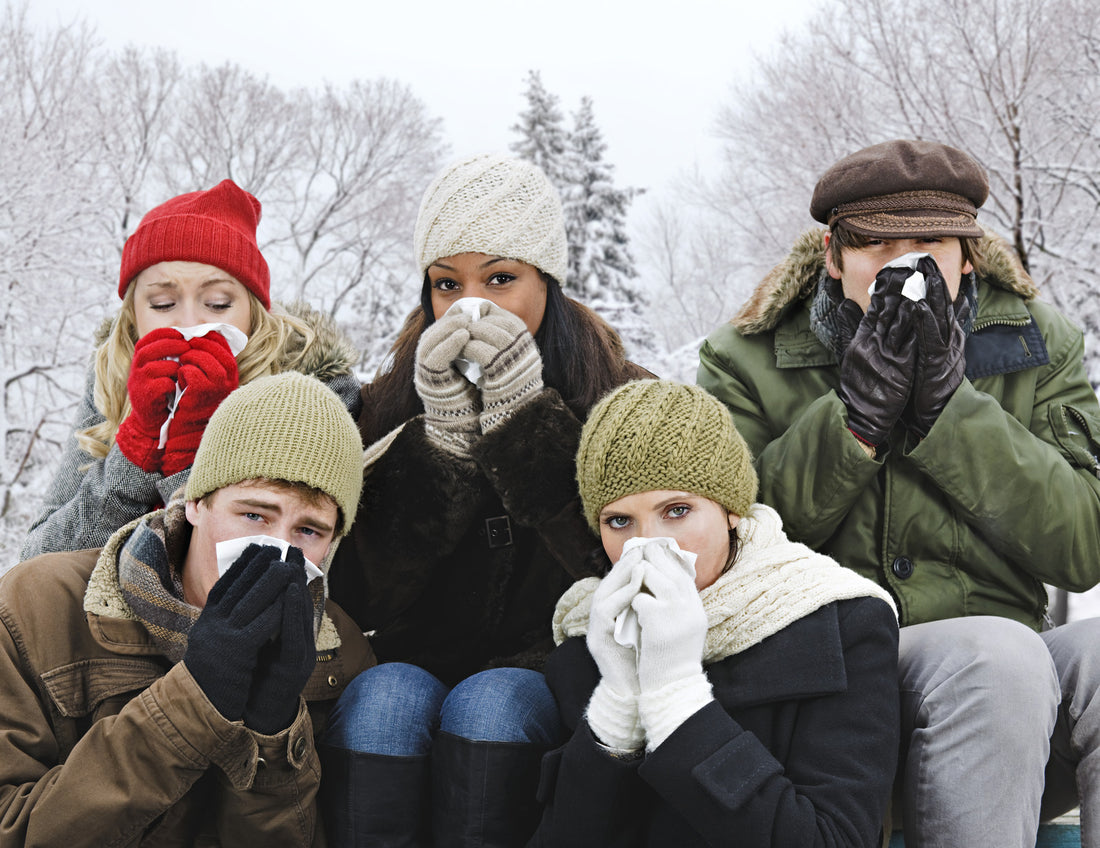
Winter and Your Immune System: Does Cold Weather Make It Easier to Catch a Cold?
Share
Brrr! When it's cold outside you just want to stay inside and warm up by the fire rather than braving the frigid temperatures outdoors. Unfortunately, it's hard to avoid exposure to the cold in the winter unless you live in an area that's warm and sunny all year round.
Living in a cooler climate has some disadvantages, especially when winter rolls around. You've probably heard that cold weather brings with it a greater risk for upper respiratory infections and influenza-like viruses. It's true that winter is the season when people are most likely to be inconvenienced with a viral illness. The average person gets around 3 colds per year, usually in the winter and early spring. Why might this be, and what role does your immune system play? Does exposure to cold make it harder for your immune system to fight off infection? Did you know that there is a new supplement on the market that you can take that will help rebuild your immune system so you may go through the whole cold and flu season without getting sick? Check It Out Here!
Cold Weather: How Does It Impact Immune Function?
The best way to avoid viral illness is to not be exposed to a virus in the first place, but avoiding those pesky little critters that hijack cells isn't always easy. If you work at an office or have kids, it's almost impossible to avoid exposure to whatever virus happens to be passing around. Fortunately, you have back-up, an immune system capable of keeping pesky viruses from gaining a foothold in your body. When you head outside in the cold air, how does it impact your immune system?
You may have heard people say, like a well-meaning friend or family member, that cold weather and the common cold go hand in hand and when you step outside in freezing temperatures your risk for catching one goes up. The idea that cold exposure increases the risk for colds may not be an old wives' tale after all. Research in animals shows when animals become chilled - their immune response to viruses becomes more sluggish.
When animals are exposed to cold, cells involved in the immune response called lymphocytes are suppressed. Plus, natural killer cells that protect against viruses go down along with other proteins involved in the immune response. In other words, your immune system can't do its job of protecting you as well when you're exposed to a cold environment.
To make matters worse, a recent study showed rhinoviruses, the most common virus that causes the common cold, replicates faster at 33 degrees Centigrade as opposed to 37 degrees Centigrade. Thirty-seven degrees Centigrade is normal body temperature, while 33 degrees Centigrade is what you expect the temperature inside your nose to be when you go outside in cold weather. A double whammy! Cold viruses are in replication mode and your immune system falls down on the job. No wonder the common cold is more common when temperatures drop. Flu viruses are also more easily transmitted in low-humidity than a higher humidity environment. It's characteristically dryer in the winter, giving influenza viruses a better chance to disseminate.
Of course, other factors play a role in the increased prevalent of wintertime colds. People gravitate more towards indoor activities when temperatures drop and are in closer contact with each other. Such "togetherness" provides more opportunity for cold viruses to spread. As to why kids get more colds and viruses than adults, has to do with their less mature immune system. Their immune system hasn't been exposed to common viruses as much as an adult's and they don't have the same degree of protective antibodies.
Protecting Yourself against Cold Weather Illnesses
How can you stay healthy this winter? Do the obvious like wash your hands more frequently and avoid putting your hands around your nose and mouth. When you go outside, cover your nose and mouth with a scarf to protect them from the cold. Get at least 7 hours of sleep a night. Not getting enough sleep suppresses immunity. Eat a nutrient-rich diet and support your immune system with immune boosting supplements like BioPro-Plus™. Get this amazing supplement by CLICKING HERE! Adding this supplement to the above check list will help you stay healthy all winter long.
-By Alternative Health Concepts
References:
Canadian Journal of Physiology and Pharmacology, 1998, 76(9): 828-836, 10.1139/y98-097.
Nature. "Cold viruses thrive in frosty conditions" May 20, 2013.
BBC News. Health. "Common Colds "Prefers Cold Noses"
Live Science. "Higher Humidity Lowers Flu Transmission" February 27, 2013.
